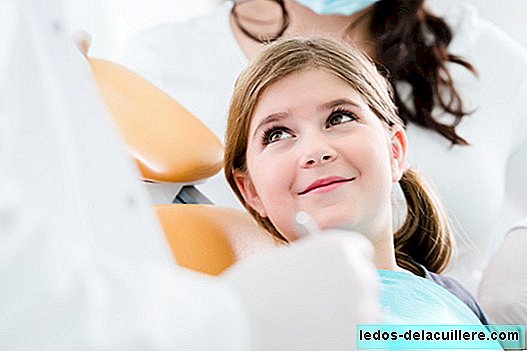Between the ages of five and seven Children usually begin to change their milk teeth for permanent ones. In some cases this process occurs before and in others afterwards since, as in everything, each child has its own rhythm.
Baby teeth fall to give way to the definitive, but in ten percent of cases there is a phenomenon known as "Shark teeth", what happens when the permanent tooth grows behind the milk tooth without it having fallen.
Why do shark teeth come out?
The children have 20 baby teeth and around six, they will begin to be pushed little by little by the permanent teeth. This pressure will cause the roots of the milk pieces to be reabsorbed, progressively increasing their mobility until they end up falling.
But on certain occasions the roots of baby teeth are too strong and resist falling, so that the definitive ones end up being born in second row, causing the appearance of the "shark teeth"
Dentists shuffle several theories that would explain this peculiar dentition:
It could be because the root of the baby teeth was not reabsorbed properly and the permanent dentition began to be placed behind
Another cause that would explain the appearance of "shark teeth" would be the appearance of milk teeth that would prevent the final pieces from growing in their proper place.
And another reason could be a simple deviation of the final teeth
When should we consult with a pediatric dentist?
Regardless of whether or not we observe this peculiarity in the teeth of our children, the visits to the pediatric dentist should be done routinely, in order to prevent possible pathologies.

The first visit should always coincide with the eruption of the first milk teeth, so that, in case of any problem (as occurs, for example, with frequent bottle caries), it can be treated as soon as possible.
If everything goes well, the second visit to the dentist will be done when the child begins to change his first milk teeth. It is at this time when the professional can warn us - if we have not seen it before - of the appearance of "shark teeth."
Typically, as we have seen before, this situation resolves itself satisfactorily in a short space of time.
Only in case the milk teeth remain immovable for longer living with permanent teeth in continuous growth, The dentist will assess preventive extraction of the milk tooth to avoid the use of orthodontics because of the crowding and malocclusion of the dental pieces.
When the milk tooth has fallen and the permanent one does not find resistance, it will tend to move forward little by little until it is completely aligned and take its rightful placeWhat we should never do
Although in these cases, the dentist will give us the guidelines to help the baby tooth fall quickly, it is important to know that we should never force it to avoid damage to the gum or the final tooth.
The child will be the one who, pushing with his tongue, will help the tooth to gradually detach. "If we had to help at some point, we should always do it with our hands very clean and with gentle movements helping us with a little gasket. Never force it" - explains Lydia Almansa, clinic assistant.
In summary
Shark teeth occur in one in ten children but except for exceptional situations in which the tooth bothers or the dentist deems it necessary, nothing will have to be done and the milk tooth will fall by itself in just a few days.
It should always be the pediatric dentist who values each specific case so it is advisable to visit him on a regular basis and not forget to help the little ones to maintain proper hygiene and proper oral health habits.

IStock photos
In Babies and More When the baby teeth fall out, Where do the final teeth come out? Nine habits that can harm the child's oral health, Seven tips to avoid baby bottle decay, Baby's first teeth, when do they leave ?, Frequently asked questions about children and orthodontics (or what happens when the teeth get messy), What to do if a baby's tooth is moved: Should we pull it or not ?, Tips to prevent cavities in children Eight tips for healthy teeth in children












